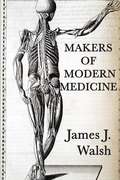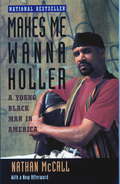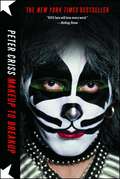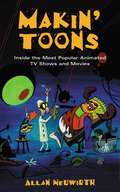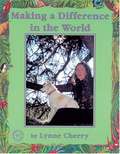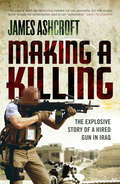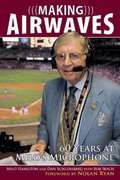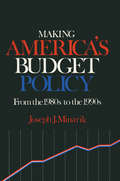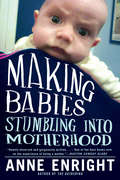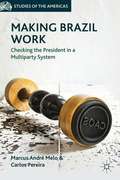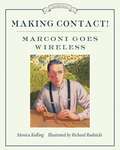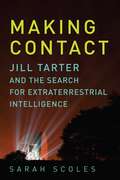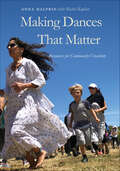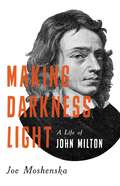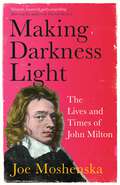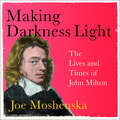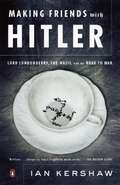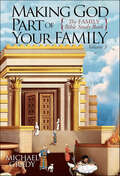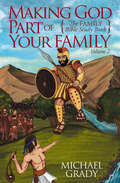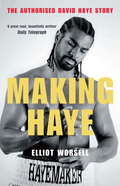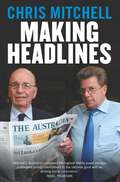- Table View
- List View
Makers of Modern Asia
by Ramachandra GuhaHardly more than a decade old, the twenty-first century has already been dubbed the Asian Century in recognition of China and Indiaâe(tm)s increasing importance in world affairs. Yet discussions of Asia seem fixated on economic indicatorsâe"gross national product, per capita income, share of global trade. Makers of Modern Asia reorients our understanding of contemporary Asia by highlighting the political leaders, not billionaire businessmen, who helped launch the Asian Century. The nationalists who crafted modern Asia were as much thinkers as activists, men and women who theorized and organized anticolonial movements, strategized and directed military campaigns, and designed and implemented political systems. The eleven thinker-politicians whose portraits are presented here were a mix of communists, capitalists, liberals, authoritarians, and proto-theocratsâe"a group as diverse as the countries they represent. From China, the worldâe(tm)s most populous country, come four: Mao Zedong, leader of the Communist Revolution; Zhou Enlai, his close confidant; Deng Xiaoping, purged by Mao but rehabilitated to play a critical role in Chinese politics in later years; and Chiang Kai-shek, whose Kuomintang party formed the basis of modern Taiwan. From India, the worldâe(tm)s largest democracy, come three: Mohandas Gandhi, Jawaharlal Nehru, and Indira Gandhi, all of whom played crucial roles in guiding India toward independence and prosperity. Other exemplary nationalists include Vietnamâe(tm)s Ho Chi Minh, Indonesiaâe(tm)s Sukarno, Singaporeâe(tm)s Lee Kuan Yew, and Pakistanâe(tm)s Zulfiqar Ali Bhutto. With contributions from leading scholars, Makers of Modern Asia illuminates the intellectual and ideological foundations of Asiaâe(tm)s spectacular rise to global prominence.
Makers of Modern Medicine
by James J. WalshMiiller entered this school in 1810 and Gorrcs did not resign his professorship until 1814, when owing to the publication of a political work he was obliged to flee from the country. It is not known how much influence Gorres exercised over young Miiller, but some at least of his precious love for the natural sciences, which even in his student days led to the making of natural collections of various kinds, seems to have been imbibed under the influence of the philosopher physiologist. The touching of the orbits of the two men, who were destined, more than any of their fellow-citizens of Coblentz, to influence Germany's future, must always remain an interesting consideration in the lives of both. Johann's parents were, as might have been expected, down in the old Catholic Rhineland in the capital of the spiritual principality of Treves, faithful members of the Roman Catholic Church. Very early in life, Johann conceived the wish to become a priest. His mother, rejoiced at her son's idea, was ready to make every possible sacrifice to secure his education. It was with the intention of education for the priesthood, then, that Johann entered the Sekunden Schule, an old college of the Jesuits, in which Jesuit tradition and methods of education still survived, and in which some of the old Jesuit pupils seem still to have held positions even during Mtiller's time as a student (1810 to 1817). It would appear probable that Ix-causc of the traditions of Jesuit teachings that held over at the school in Coblentz, and perhaps, too, because of the presence of some of the old masters and teachers trained by them, Miiller knew the ancient languages so well. He made his own translations of Plato and Aristotle, and consulted the latter.
Makes Me Wanna Holler: A Young Black Man in America
by Nathan MccallExamining the complexities of the problems of black youths from an insider's perspective, an African-American journalist recalls his own troubled childhood, his rehabilitation while in prison, and his successful Washington Post career.
Makeup to Breakup: My Life In and Out of Kiss
by Peter CrissLEGENDARY founding KISS drummer Peter “Catman” Criss has lived an incredible life in music, from the streets of Brooklyn to the social clubs of New York City to the ultimate heights of rock ’n’ roll success and excess. KISS formed in 1973 and broke new ground with their elaborate makeup, live theatrics, and powerful sound. The band emerged as one of the most iconic hard rock acts in music history. Peter Criss, the Catman, was the heartbeat of the group. From an elevated perch on his pyrotechnic drum riser, he had a unique vantage point on the greatest rock show of all time, with the KISS Army looking back at him night after night. Peter Criscuola had come a long way from the homemade drum set he pounded on nonstop as a kid growing up in Brooklyn in the fifties. He endured lean years, street violence, and the rollercoaster music scene of the sixties, but he always knew he’d make it. Makeup to Breakup is Peter Criss’s eye-opening journey from the pledge to his ma that he’d one day play Madison Square Garden to doing just that. He conquered the rock world—composing and singing his band’s all-time biggest hit, “Beth” (1976)—but he also faced the perils of stardom and his own mortality, including drug abuse, treatment in 1982, near-suicides, two broken marriages, and a hard-won battle with breast cancer. Criss opens up with a level of honesty and emotion previously unseen in any musician’s memoir. Makeup to Breakup is the definitive and heartfelt account of one of rock’s most iconic figures, and the importance of faith and family. Rock ’n’ roll has been chronicled many times, but never quite like this.
Makhanlal Chaturvedi
by Shrikant JoshiMakhanlal Chaturvedi has written in all forms of literature. He has made the art of life an immortalized one. He has given new dimension to the expression and a sense of dedication to the literature. Srikant Joshi brings brings out the colours of life of Chaturvedi.
Makhdoom Muhiuddin
by Nishat ZaidiWorks on Ghazals and poems by Mumbai based poet Makhdoom Mohiuddin.
Makin' Toons: Inside the Most Popular Animated TV Shows and Movies
by Allan NeuwirthFrom the first drawing board sketch to wriggling TV character, Makin' Toons illustrates the thrills and challenges of making animated cartoon movies as told by the industry's most successful creators. Cartoon lovers everywhere will be treated to 47 personal interviews with animation artists and industry leaders ranging from Shrek director Andrew Adamson to Rugrats producer Gabor Csupo. These and dozens of other fascinating firsthand accounts chronicle the behind-the-scene antics and commercial dynamics behind such blockbusters as The Simpsons, South Park, Beauty and the Beast, and Dragon Tales, to name just a few. Author Allan Neuwirth-an accomplished animation artist and writer himself-spices the book with insightful comments, hilarious anecdotes, and a true "toon artist's" sense of humor. He also includes 75 never-before-published concept drawings, character designs, storyboards, and much more.Allworth Press, an imprint of Skyhorse Publishing, publishes a broad range of books on the visual and performing arts, with emphasis on the business of art. Our titles cover subjects such as graphic design, theater, branding, fine art, photography, interior design, writing, acting, film, how to start careers, business and legal forms, business practices, and more. While we don't aspire to publish a New York Times bestseller or a national bestseller, we are deeply committed to quality books that help creative professionals succeed and thrive. We often publish in areas overlooked by other publishers and welcome the author whose expertise can help our audience of readers.
Making A Difference in the World
by Lynne Cherry John Christopher FineA prominent children's book author and illustrator shares her life, her daily activities, her interest in environmental preservation, and her creative process, showing how all are intertwined.
Making A Killing: The Explosive Story of a Hired Gun in Iraq
by James AshcroftIn September 2003, James 'Ash' Ashcroft, a former British Infantry Captain, arrived in Iraq as a 'gun for hire'. It was the beginning of an 18-month journey into blood and chaos.In this action-packed page-turner, Ashcroft reveals the dangers of his adrenalin-fuelled life as a security contractor in Baghdad, where private soldiers outnumber non-US Coalition forces in a war that is slowly being privatised. From blow-by-blow accounts of days under mortar bombardment to revelations about life operating deep within the Iraqi community, Ashcroft shares the real, unsanitised story of the war in Iraq - and its aftermath - direct from the front line.
Making Airwaves: 60 Years at Milo's Microphone
by Milo Hamilton Dan Schlossberg Bob IbachSportscaster, Milo Hamilton, discusses his 60-year as a sports announcer, concentrating on baseball. He discusses the teams and people with whom he worked.
Making America's Budget Policy from the 1980's to the 1990's
by Joseph J. MinarikThis collection of articles traces the evolution over the 1980s of budget policy and tax reform by an architect of the Bradley tax reform bill. The articles present a chronological analysis of tax changes and the heated controversy over budget policy and the deficit. It concludes with an analysis of what the future holds. The author, currently staff director of the Joint Economic Committee of Congress, has the perspective of a fiscal expert with many years on the Washington scene.
Making Babies: Stumbling into Motherhood
by Anne EnrightA San Francisco Chronicle Lit Pick "Much of the book is astonishingly funny; the rest would break your heart." --Colm Tóibín Anne Enright is one of the most acclaimed novelists of her generation. The Gathering won the 2007 Man Booker Prize, and her follow-up novel, The Forgotten Waltz, garnered universal praise for her luminous language and deep insight into relationships. Now, in Making Babies, Enright offers a new kind of memoir: an unapologetic look at the very personal experience of becoming a mother. With a refreshing no-nonsense attitude, Enright opens up about the birth and first two years of her children's lives. Enright was married for eighteen years before she and her husband Martin, a playwright, decided to have children. Already a confident, successful writer, Enright continued to work in her native Ireland after each of her two babies was born. While each baby slept, those first two years of life, Enright wrote, in dispatches, about the mess, the glory, and the raw shock of motherhood. Here, unfiltered and irreverent, are Enright's keen reactions to the pains of pregnancy, the joys of breast milk, and the all-too-common pressures to be the "perfect" parent. Supremely observant and endlessly quizzical, Enright is never saccharine, always witty, but also deeply loving. Already a bestseller in the UK, Making Babies brings Enright's autobiographical writing to American readers for the first time. Tender and candid, it captures beautifully just what it's like for a working woman to become a mother. The result is a moving chronicle of parenthood from one of the most distinctive and gifted authors writing today.
Making Brazil Work
by Carlos Pereira Marcus André MeloThis book offers the first conceptually rigorous analysis of the political and institutional underpinnings of Brazil's recent rise. Using Brazil as a case study in multiparty presidentialism, the authors argue that Brazil's success stems from the combination of a constitutionally strong president and a robust system of checks and balances.
Making Contact!: Marconi Goes Wireless (Great Idea Series #5)
by Monica KullingThe fifth book in Tundra's Great Idea Series, Making Contact! tells the story of Guglielmo Marconi, who became the father of wireless communication. As a boy, Marconi loved science and invention. Born in 1874 in Bologna, Italy, to a wealthy family, Marconi grew up surrounded by books in his father's library. He was fascinated with radio waves and learned Morse code, the language of the telegraph. A retired telegraph operator taught him how to tap messages on the telegraph machine. At the age of twenty, Marconi realized that no one had invented a wireless telegraph. Determined to find a way to use radio waves to send wireless messages, Marconi found his calling. And, thanks to his persistence, on December 12, 1901, for the first time ever, a wireless signal traveled between two continents. The rest is history. Monica Kulling's playful, informative text, combined with the compelling illustrations of artist Richard Rudnicki, bring an amazing inventor and his times to life.
Making Contact: Jill Tarter And The Search For Extraterrestrial Intelligence
by Sarah ScolesFor anyone who has ever looked up at the night sky and wondered, "Are we alone?" A brilliant examination of the science behind the search for extraterrestrial intelligence and its pioneer, Jill Tarter, the inspiration for the main character in Carl Sagan's Contact. Jill Tarter is a pioneer, an innovator, an adventurer, and a controversial force. At a time when women weren’t encouraged to do much outside the home, Tarter ventured as far out as she could—into the three-Kelvin cold of deep space. And she hasn’t stopped investigating a subject that takes and takes without giving much back. Today, her computer's screensaver is just the text “SO…ARE WE ALONE?” This question keeps her up at night. In some ways, this is the question that keep us all up at night. We have all spent dark hours wondering about our place in it all, pondering our "aloneness," both terrestrial and cosmic. Tarter’s life and her work are not just a quest to understand life in the universe: they are a quest to understand our lives within the universe. No one has told that story, her story, until now. It all began with gazing into the night sky. All those stars were just distant suns—were any of them someone else's sun? Diving into the science, philosophy, and politics of SETI—searching for extraterrestrial intelligence—Sarah Scoles reveals the fascinating figure at the center of the final frontier of scientific investigation. This is the perfect book for anyone who has ever looked up at the night sky and wondered if we are alone in the universe.
Making Dances That Matter: Resources for Community Creativity
by Rachel Kaplan Anna HalprinAnna Halprin, vanguard postmodern dancer turned community artist and healer, has created ground-breaking dances with communities all over the world. Here, she presents her philosophy and experience, as well as step-by-step processes for bringing people together to create dances that foster individual and group well-being. At the heart of this book are accounts of two dances: the Planetary Dance, which continues to be performed throughout the world, and Circle the Earth. The Circle the Earth workshop for people living with AIDS has generated dozens of "scores" for others to adapt. In addition, the book provides a concrete guide to Halprin's celebrated Planetary Dance. Now more than 35 years old, Planetary Dance promotes peace among people and peace with the Earth. Open to everyone, it has been performed in more than 50 countries. In 1995 more than 400 participants joined her in a Planetary Dance in Berlin commemorating the fiftieth anniversary of the signing of the Potsdam Agreements, at the end of World War II. More recently, she took the Planetary Dance to Israel, bringing together Israelis and Palestinians as well as other nationalities. Throughout this book Halprin shows how dance can be a powerful tool for healing, learning and mobilizing change, and she offers insight and advice on facilitating groups. If we are to survive, Halprin argues, we must learn, experientially, how our individual stories weave together and strengthen the fabric of our collective body. Generously illustrated with photographs, charts and scores, this book will be a boon to dance therapists, educators and community artists of all types.
Making Darkness Light: A Life of John Milton
by Joe MoshenskaAn innovative and elegant new biography of John Milton from an acclaimed Oxford professorJohn Milton was once essential reading for visionaries and revolutionaries, from William Blake to Ben Franklin. Now, however, he has become a literary institution—intimidating rather than inspiring.In Making Darkness Light, Oxford professor Joe Moshenska rediscovers a poet whose rich contradictions confound his monumental image. Immersing ourselves in the rhythms and textures of Milton&’s world, we move from the music of his childhood home to his encounter with Galileo in Florence into his idiosyncratic belief system and his strange, electrifying imagination.Making Darkness Light will change the way we think about Milton, the place of his writings in his life, and his life in history. It is also a book about Milton&’s place in our times: about our relationship with the Western canon, about why and how we read, and about what happens when we let someone else&’s ideas inflect our own.
Making Darkness Light: The Lives and Times of John Milton
by Joe MoshenskaFor most of us John Milton has been consigned to the dusty pantheon of English literature, a grim puritan, sightlessly dictating his great work to an amanuensis, removed from the real world in his contemplation of higher things. But dig a little deeper and you find an extraordinary and complicated human being.Revolutionary and apologist for regicide, writer of propaganda for Cromwell's regime, defender of the English people and passionate European, scholar and lover of music and the arts - Milton was all of these things and more.Making Darkness Light shows how these complexities and contradictions played out in Milton's fascination with oppositions - Heaven and Hell, light and dark, self and other - most famously in his epic poem Paradise Lost. It explores the way such brutal contrasts define us and obscure who we really are, as the author grapples with his own sense of identity and complex relationship with Milton. Retracing Milton's footsteps through seventeenth century London, Tuscany and the Marches, he vividly brings Milton's world to life and takes a fresh look at his key works and ideas around the nature of creativity, time and freedom of expression. He also illustrates the profound influence of Milton's work on writers from William Blake to Virginia Woolf, James Joyce to Jorge Luis Borges.This is a book about Milton, that also speaks to why we read and what happens when we choose over time to let another's life and words enter our own. It will change the way you think about Milton forever.
Making Darkness Light: The Lives and Times of John Milton
by Joe MoshenskaFor most of us John Milton has been consigned to the dusty pantheon of English literature, a grim puritan, sightlessly dictating his great work to an amanuensis, removed from the real world in his contemplation of higher things. But dig a little deeper and you find an extraordinary and complicated human being.Revolutionary and apologist for regicide, writer of propaganda for Cromwell's regime, defender of the English people and passionate European, scholar and lover of music and the arts - Milton was all of these things and more.Making Darkness Light shows how these complexities and contradictions played out in Milton's fascination with oppositions - Heaven and Hell, light and dark, self and other - most famously in his epic poem Paradise Lost. It explores the way such brutal contrasts define us and obscure who we really are, as the author grapples with his own sense of identity and complex relationship with Milton. Retracing Milton's footsteps through seventeenth century London, Tuscany and the Marches, he vividly brings Milton's world to life and takes a fresh look at his key works and ideas around the nature of creativity, time and freedom of expression. He also illustrates the profound influence of Milton's work on writers from William Blake to Virginia Woolf, James Joyce to Jorge Luis Borges.This is an audiobook about Milton, that also speaks to why we read and what happens when we choose over time to let another's life and words enter our own. It will change the way you think about Milton forever.(P) 2021 Hodder & Stoughton Limited
Making Friends with Hitler: Lord Londonderry, the Nazis and the Road to World War II
by Ian KershawCharles Stewart Henry Vane-Tempest-Stewart, the 7th Marquess of Londonderry, was born to power and command. Scion of one of Britain's most aristocratic families, cousin of Churchill and confidant of the king, owner of vast coal fields and landed estates, married to the doyenne of London's social scene, Londonderry was an ornament to his class, the 0. 1 percent of the population who still owned 30 percent of England's wealth as late as 1930. But history has not been kind to "Charley," as the king called him, because, in his own words, he "backed the wrong horse," and a very dark horse indeed: Adolf Hitler and his Nazi Party. Londonderry was hardly the only British aristocrat to do so, but he was the only Cabinet member to do so, and it ruined him. In a final irony, his grand London house was bombed by the German Luftwaffe in the blitz. Ian Kershaw is not out to rehabilitate Lord Londonderry but to understand him and to expose why he was made a scapegoat for views that were much more widely held than anyone now likes to think. H. L. Mencken famously said that "for every complex problem, there is a solution that is simple, neat, and wrong. " The conventional explanation of the coming of World War II is a simple story of the West's craven appeasement of Hitler in the face of his bullying. Through the story of how Lord Londonderry came to be mixed up with the Nazis and how it all went horribly wrong for him, Ian Kershaw shows us that behind the familiar cartoon is a much more complicated and interesting reality, full of miscalculations on both sides, miscalculations that proved to be among the most fateful in history.
Making God Part of Your Family: The Family Bible Study Book Volume 3
by Michael GradyMaking God Part of Your Family Volume 3 strives to bring God’s plan to life for individuals and their families as He chose to reveal these truths through the stories in the Old Testament.Most would agree that the Old Testament stories can be difficult to relate to and understand. Veteran Bible teacher Michael Grady retells the Old Testament stories in concise, thought-provoking doses that are easy to understand and intended to stimulate family discussions. He demonstrates that the Old Testament stories are much more than just a history of the Israelites (God’s chosen family); they are parables detailing God’s guide to living and his eternal plan for redemption and salvation for all who choose to believe. The stories in Making God Part of Your Family Volume 3 provide a unique combination—they are both simple enough for children to understand and deep enough for parents to grow in the knowledge and wisdom of God’s Word. This vibrant, yet carefully researched volume brings families closer together and helps them clearly establish their identity as children of God and brothers and sisters of Jesus.
Making God Part of Your Family: The Family Bible Study Guide -volume 2 (The Family Bible Study Book #2)
by Michael GradyA veteran Bible teacher offers Old Testament stories and family discussion prompts in this accessible yet thoughtful Bible study book. In Making God Part of Your Family, Bible teacher Michael Grady presents the Old Testament stories in concise, thought provoking doses intended to stimulate family discussions. These stories are both simple enough for your children to understand and deep enough to offer new insights for parents who want to further their knowledge of God&’s Word. More than just a collection of Bible stories, this study book can help you more firmly establish your family&’s identity as children of God and brothers and sisters of Jesus. Whether your goal is to spend ten to fifteen minutes a day on a dinner-time devotional or bedtime reading with your children or spend more in-depth study time together once a week, this flexible resource will make it easier to establish a family routine amidst hectic schedules. Making God Part of Your Family can help you: Develop a deeper relationship with God our Father, and his son, JesusLearn how we are part of God&’s familyLearn how God expects us to live amidst the joys and sorrows of lifeApply practical lessons and eternal truths to the situations you face today
Making Haye: The Authorised David Haye Story
by Elliot WorsellDavid 'The Hayemaker' Haye is the former WBA world heavyweight champion and the former undisputed (WBA, WBC and WBO) world cruiserweight champion. Haye is one of British boxing's most celebrated and successful ring champions of the modern era and has won twenty-three of twenty-five professional fights. He has twice been shortlisted for BBC Sports Personality of the Year and is now recognised as the face of British and world boxing. bHaye was involved in the biggest heavyweight title clash for nearly a decade when he fought Wladimir Klitschko in July 2011, with the fight televised live in over 140 countries. Although Haye ultimately lost his belt, following a twelve-round points decision, his charismatic approach has reminded fight fans of a time when the heavyweight championship was the greatest prize in sport. bThis is the authorised story of how Haye reached this point, and details the ten-year rise of the boxer from a precocious World Amateur Champion. Crafted by close confidant Elliot Worsell, Making Haye offers behind-the-scenes, never-before-told insights into some of the most pivotal ring wars of David Haye's turbulent, and at times controversial, professional boxing career.
Making Haye: The Authorised David Haye Story
by Elliot WorsellDavid 'The Hayemaker' Haye is the former WBA world heavyweight champion and the former undisputed (WBA, WBC and WBO) world cruiserweight champion. Haye is one of British boxing's most celebrated and successful ring champions of the modern era and has won twenty-three of twenty-five professional fights. He has twice been shortlisted for BBC Sports Personality of the Year and is now recognised as the face of British and world boxing. Haye was involved in the biggest heavyweight title clash for nearly a decade when he fought Wladimir Klitschko in July 2011, with the fight televised live in over 140 countries. Although Haye ultimately lost his belt, following a twelve-round points decision, his charismatic approach has reminded fight fans of a time when the heavyweight championship was the greatest prize in sport. This is the authorised story of how Haye reached this point, and details the ten-year rise of the boxer from a precocious World Amateur Champion. Crafted by close confidant Elliot Worsell, Making Haye offers behind-the-scenes, never-before-told insights into some of the most pivotal ring wars of David Haye's turbulent, and at times controversial, professional boxing career.
Making Headlines
by Chris MitchellAs editor-in-chief of The Australian, Chris Mitchell ran the largest stable of journalists with the largest editorial budget in the country for more than twelve years. This entertaining and deeply revealing book offers readers riveting insights into the quirks and foibles of some of the most powerful politicians and media executives this country has produced. A controversial figure throughout his quarter of a century as a daily editor, Chris Mitchell still maintains close regular contact with past prime ministers, editors and media CEOs. Making Headlines highlights the judgements and thinking that govern daily newspaper journalism at the highest level and the battles fought to publish tough stories about the rich and the powerful, the disenfranchised and the powerless. Making Headlines is compulsory reading for citizens who care, the political class inside the beltway and beyond, and wannabe journalists in search of a job.

